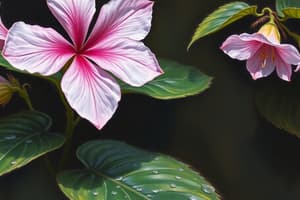Podcast
Questions and Answers
What is the effect of Hypericin on neurotransmitters?
What is the effect of Hypericin on neurotransmitters?
- No effect on neurotransmitters
- Decrease epinephrine, serotonin and dopamine
- Increase epinephrine, serotonin and dopamine (correct)
- Decrease GABA and increase dopamine
What is the advantage of hypnotics and sedatives from plant origin?
What is the advantage of hypnotics and sedatives from plant origin?
- High risk of tolerance and habituation
- Mild in their action, low risk of overdose and no risk of tolerance, habituation or addiction (correct)
- Risk of overdose is high
- Only used in pregnancy and lactation
What is the effect of Valerian on GABA?
What is the effect of Valerian on GABA?
- No effect on GABA
- Inhibit synthesis and release of GABA
- Stimulate synthesis and release of GABA (correct)
- Increase reuptake and catabolism of GABA
What is the effect of Caffeine on Adenosine receptors?
What is the effect of Caffeine on Adenosine receptors?
What is the effect of Passion flower on neurotransmitters?
What is the effect of Passion flower on neurotransmitters?
What is the effect of Kavalactones on GABA?
What is the effect of Kavalactones on GABA?
What is the mechanism of action of Narcotic Analgesics?
What is the mechanism of action of Narcotic Analgesics?
What is the treatment for Depression?
What is the treatment for Depression?
What is the effect of Feverfew on Arachidonic acid synthesis?
What is the effect of Feverfew on Arachidonic acid synthesis?
What is the effect of Hyperforin on GABA?
What is the effect of Hyperforin on GABA?
What is the main characteristic of Alzheimer's disease?
What is the main characteristic of Alzheimer's disease?
What is the active compound found in Calabar beans used to treat Alzheimer's disease?
What is the active compound found in Calabar beans used to treat Alzheimer's disease?
What is the effect of Ginkgolides A and B on platelet-activating factor?
What is the effect of Ginkgolides A and B on platelet-activating factor?
What is the side effect of Ginkgo biloba that requires dose adjustment in diabetic patients?
What is the side effect of Ginkgo biloba that requires dose adjustment in diabetic patients?
What is the herb used to treat numbness in feet in the given case study?
What is the herb used to treat numbness in feet in the given case study?
What is the effect of Ginkgo biloba on tau protein phosphorylation?
What is the effect of Ginkgo biloba on tau protein phosphorylation?
What is the common symptom of depression in the given case study?
What is the common symptom of depression in the given case study?
What is the herb used to treat insomnia in the given case study?
What is the herb used to treat insomnia in the given case study?
Flashcards are hidden until you start studying
Study Notes
CNS Depressants
- Anthraquinones (Hypericin) from St John's Wort inhibit MAO, increasing epinephrine, serotonin, and dopamine
- Hyperforin decreases GABA binding to receptors
- Side effects: activating CYP 450, reducing concentrations of anticonvulsants, theophylline, contraceptives, and warfarin
- Contraindications: pregnancy, lactation
- Dosage form: Tablets (300 mg)
Valerian
- Sesquiterpene volatile oils (0.8% Valerianic acid) stimulate GABA synthesis and release
- Inhibit GABA reuptake and catabolism, increasing extracellular GABA concentrations
- Side effects: severe depression, cardiac function disturbance (high dose)
- Contraindications: pregnancy, children (oxytocic due to Iridoids)
- Dosage form: Infusion (2-3 gm) at bedtime
Passion Flower
- Gama-Pyrone derivatives (Maltol & Ethyl maltol) and Flavonoids C-glycosides (vitexin) have affinity for GABA receptors
- Increase GABA release and inhibit reuptake and catabolism (CNS depressant)
- Monoamine oxidase inhibition effect (can be used as an antidepressant, CNS stimulant)
- Side effects: uterine stimulant, not used in pregnancy
- Certain aminoglycosides (Clindamycin) potentiate the relaxing action of Passion flower
Kava
- Kavalactones (Kavapyrones): Kavain, Methysticin, and Yangonin increase GABA binding sites
- Inhibit noradrenaline uptake and catabolism, leading to mood elevation and depression treatment
- Side effects: dermopathy (reversible yellow discoloration), liver damage
- Interactions: diuretics, alcohol, and other depressants may potentiate the action of Kava
- Dosage form: Decoction (1.5-3 gm) at bedtime
Hops
- Alpha acid (Humulone) and Beta acid (Lupulone) increase GABA release and receptors
- Side effects: menstrual cycle disturbance, not used in pregnancy
- Dosage form: Decoction (1-2 gm) at bedtime
Narcotic Analgesics
- Opiate alkaloids derived from opium (dried exudates of poppy capsule, Papaver somniferum)
- Examples: Morphine, Levorphanol, Methadone, Fentanyl
- Mechanism: mimics the action of endogenous opioids at receptors, inhibiting release of neurotransmitters
- Therapeutic indications: relieve pain associated with myocardial infarction, cancer, and post-operation
- Side effects: sedation, miosis, depression, respiratory depression, constipation, biliary spasm, hypotension, euphoria, and dependence
Feverfew
- Sesquiterpene Lactone (Parthenolide) inhibits Arachidonic acid synthesis, prostaglandin and leukotriene synthesis
- Decreases smooth muscle spasm, inhibits platelet aggregation, and histamine release (anti-allergic) and serotonin secretion
- Side effects: mouth ulcers, tongue swelling, bleeding disorders with warfarin
- Contraindications: patients hypersensitive to drugs of family Asteraceae (Chamomile)
- Dosage form: 50-250 mg daily
Ginkgo Biloba
- 6% Terpene (Ginkgolides) and 24% flavonoids
- Ginkgolides A and B are platelet-activating factor antagonists and neuro-protective
- Inhibit monoamine oxidase (increase dopamine and acetylcholine), protect against amyloid peptide synthesis
- Relieve cerebral ischemia and prevent memory deterioration (dementia)
- Side effects: ototoxicity with aminoglycosides, hypoglycemia, bleeding, hypertension, loss of appetite
- Dosage forms: Tablets, Capsules, Syrup
Studying That Suits You
Use AI to generate personalized quizzes and flashcards to suit your learning preferences.




